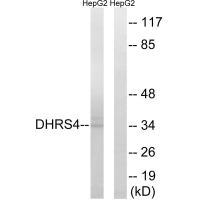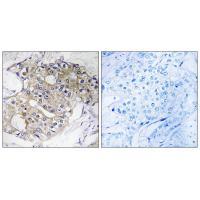

| WB | 咨询技术 | Human,Mouse,Rat |
| IF | 咨询技术 | Human,Mouse,Rat |
| IHC | 1/50-1/100 | Human,Mouse,Rat |
| ICC | 技术咨询 | Human,Mouse,Rat |
| FCM | 咨询技术 | Human,Mouse,Rat |
| Elisa | 咨询技术 | Human,Mouse,Rat |
| Aliases | AI043103; AI790593; D14Ucla2; dehydrogenase/reductase (SDR family) member 4; EC 1.1.1.184 |
| Entrez GeneID | 10901; |
| WB Predicted band size | 32-34kDa |
| Host/Isotype | Rabbit IgG |
| Antibody Type | Primary antibody |
| Storage | Store at 4°C short term. Aliquot and store at -20°C long term. Avoid freeze/thaw cycles. |
| Species Reactivity | Human |
| Immunogen | Synthesized peptide derived from internal of human DHRS4. |
| Formulation | Purified antibody in PBS with 0.05% sodium azide. |
+ +
以下是关于DHRS4抗体的3篇参考文献,涵盖其功能研究及抗体应用:
---
1. **文献名称**:*DHRS4 and its splicing variant DHRS4L1 are involved in cell proliferation and differentiation*
**作者**:Z. Li, Y. Wang, et al.
**摘要**:该研究通过制备特异性DHRS4抗体,揭示了DHRS4及其剪接变体DHRS4L1在结肠癌细胞增殖和分化中的作用。抗体用于Western blot和免疫荧光实验,证实两种蛋白在亚细胞定位中的差异及对视黄酸代谢通路的影响。
---
2. **文献名称**:*Characterization of a monoclonal antibody against human DHRS4 for detecting its expression in hepatocellular carcinoma*
**作者**:H. Chen, J. Liu, et al.
**摘要**:研究团队开发了一种针对人源DHRS4的单克隆抗体,并通过免疫组化验证其在肝癌组织中的表达下调。抗体特异性高,可用于临床样本检测,提示DHRS4可能作为肝癌潜在生物标志物。
---
3. **文献名称**:*DHRS4 interacts with p53 to regulate antioxidant defense in response to oxidative stress*
**作者**:M. Zhang, R. Xu, et al.
**摘要**:利用DHRS4抗体进行免疫共沉淀实验,发现DHRS4与p53蛋白直接互作,调控细胞抗氧化反应。研究证明DHRS4通过此通路影响氧化应激条件下的细胞存活,抗体在机制解析中起关键作用。
---
如需更多文献,建议在PubMed或Web of Science中检索关键词“DHRS4 antibody”或“DHRS4 immunohistochemistry”。
The DHRS4 (Dehydrogenase/Reductase 4) antibody is a tool used to study the DHRS4 protein, a member of the short-chain dehydrogenase/reductase (SDR) superfamily. DHRS4 is encoded by the DHRS4 gene located on human chromosome 1p36.13 and is implicated in NAD(P)H-dependent oxidation-reduction reactions. It plays roles in cellular processes such as retinoid metabolism, steroid hormone regulation, and detoxification pathways. Structurally, DHRS4 contains conserved motifs typical of SDR enzymes, including a cofactor-binding domain and catalytic residues, enabling its enzymatic activity.
Antibodies targeting DHRS4 are essential for detecting its expression and localization in tissues or cells. They are widely used in techniques like Western blotting, immunohistochemistry, and immunofluorescence to explore DHRS4's physiological and pathological roles. Research has linked DHRS4 dysregulation to diseases such as cancer, neurodegenerative disorders, and metabolic syndromes. For example, reduced DHRS4 expression has been observed in certain cancers, suggesting potential tumor-suppressive functions.
DHRS4 antibodies are typically polyclonal or monoclonal, with specificity validated through knockout controls or peptide-blocking assays. Commercial antibodies often include recombinant protein-derived versions to enhance reproducibility. Challenges in antibody development include cross-reactivity with homologous SDR family members due to conserved domains. Ongoing studies aim to clarify DHRS4's interactions, post-translational modifications, and therapeutic potential, positioning DHRS4 antibodies as critical reagents in both basic and translational research.
×